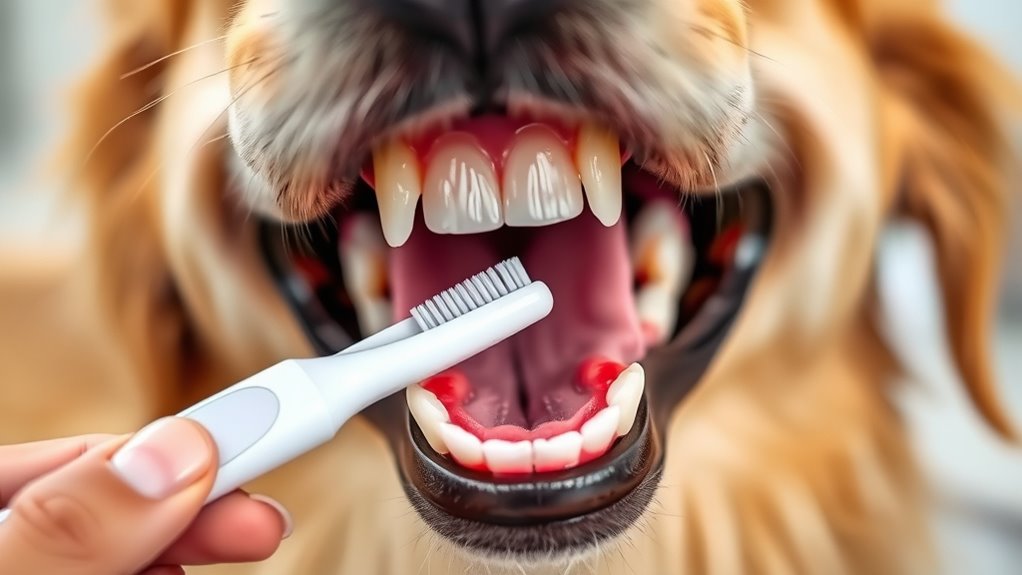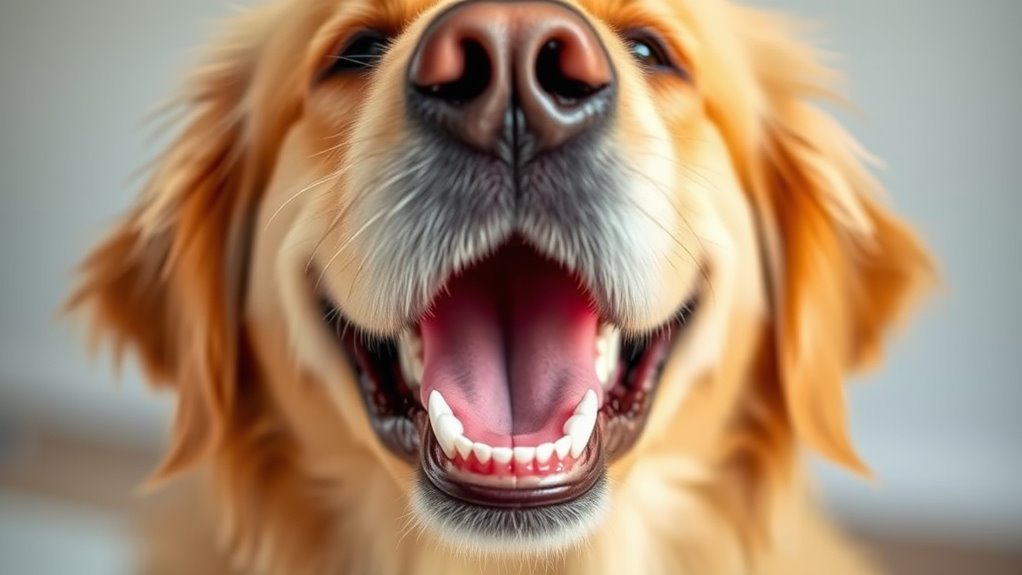Regular dental care is essential for your pet’s health because it helps prevent plaque buildup, gum disease, and potential systemic illnesses. Using pet-specific toothpaste and gentle brushing can dislodge plaque before it hardens into tartar, reducing bad breath and discomfort. Proper tools and routine professional cleanings guarantee thorough care and early detection of issues. Keep your pet’s mouth healthy and fresh—discover more tips to protect their smile.
Key Takeaways
- Regular oral hygiene prevents plaque buildup, tartar formation, and gum disease in pets.
- Pet-specific toothpaste is essential, as human toothpaste is toxic to animals.
- Brushing with proper tools and techniques helps dislodge plaque and maintain fresh breath.
- Consistent oral care supports overall health and reduces risk of systemic health issues.
- Professional cleanings complement daily routines and ensure thorough removal of stubborn plaque.

Taking care of your pet’s dental health is essential for their overall well-being. When you prioritize their oral hygiene, you’re helping prevent a range of health issues, from bad breath to serious infections. One of the key aspects of maintaining good dental health is effective plaque removal. Plaque, a sticky film of bacteria, forms on your pet’s teeth daily. If it’s not regularly removed, it can harden into tartar, which leads to gum disease, tooth decay, and even systemic problems affecting their organs. Regular brushing and professional cleanings are your best tools to keep plaque at bay, ensuring your pet’s mouth stays healthy and their breath remains fresh.
You might wonder how to effectively remove plaque and keep your pet’s teeth clean. The answer lies in consistent, gentle brushing with pet-safe toothpaste. Unlike human toothpaste, which can be toxic to animals, specially formulated pet toothpaste helps clean teeth without causing harm. When you brush your pet’s teeth, you physically dislodge plaque before it has a chance to harden into tartar. This process not only helps with plaque removal but also strengthens your bond with your pet, making dental care a positive experience rather than a stressful chore. Start slowly, using a small amount of toothpaste, and gradually increase the duration of brushing sessions as your pet becomes accustomed to it. Using the right toothbrush—either a finger brush or a small, soft-bristled one—can make the task easier and more effective.
In addition to regular brushing, professional dental cleanings performed by your veterinarian are crucial. These cleanings allow for thorough plaque removal in areas that are difficult for you to reach at home. Veterinarians can also identify early signs of dental disease, such as red or swollen gums, which might otherwise go unnoticed. Combining daily brushing with periodic professional cleanings creates a complete approach to dental health that can prevent painful and costly dental problems down the line.
Frequently Asked Questions
Can I Use Human Toothpaste on My Pet?
No, you shouldn’t use human toothpaste on your pet. Human toothpaste contains ingredients like fluoride and xylitol, which can be toxic to pets. Instead, use pet toothbrushes and flavored toothpaste specifically designed for animals, making the experience more pleasant for your pet. These products are safe and effective for maintaining your pet’s oral hygiene, helping prevent dental issues and keeping their breath fresh.
How Often Should I Brush My Pet’s Teeth?
You should brush your pet’s teeth daily or at least several times a week to effectively control plaque and prevent gingivitis. Regular brushing helps remove buildup that can lead to dental disease, keeping your pet’s mouth healthy. Consistent oral hygiene is key for gingivitis prevention and maintaining fresh breath. Use pet-specific toothpaste and gentle techniques, making dental care a positive routine for your furry friend.
Are Dental Treats Effective for Oral Health?
Dental treats can definitely boost your pet’s oral health, but they shouldn’t replace brushing. They are designed to reduce plaque and freshen breath, making them effective extras. Remember, consistency counts—combine treats with regular brushing and vet check-ups for thorough care. By balancing treats with proper hygiene, you help keep your pet’s teeth healthy, happy, and free from dental diseases, creating a caring, comprehensive oral health routine.
When Should I Schedule a Dental Check-Up?
You should schedule a dental check-up for your pet annually or sooner if you notice bad breath, bleeding gums, or difficulty eating. During the appointment, your vet may use dental anesthesia for a thorough cleaning. Consider pet dental insurance to help cover costs. Regular check-ups guarantee your pet’s oral health stays in top shape, preventing future issues and keeping them comfortable and happy.
What Signs Indicate Dental Problems in Pets?
If you notice your pet’s bad breath or red gums, it’s like a neon sign flashing “dental trouble ahead.” These signs aren’t just annoying; they signal potential problems like infection or gum disease. Don’t ignore them, or you might end up with more than just a smelly pet. Regular checks and good oral hygiene can save your pet from painful issues and keep their smile shining bright.
Conclusion
Just like the legendary tale of Fido’s brave adventures, your pet’s health depends on daily care. Regular brushing and quality toothpaste keep their teeth strong, preventing pain and costly vet visits. Think of it as protecting your furry companion’s smile—their own shining beacon of happiness. By staying consistent, you guarantee they’re not just a hero in your stories but in their own little world too. Remember, a healthy mouth is the key to a happy, wagging life.









